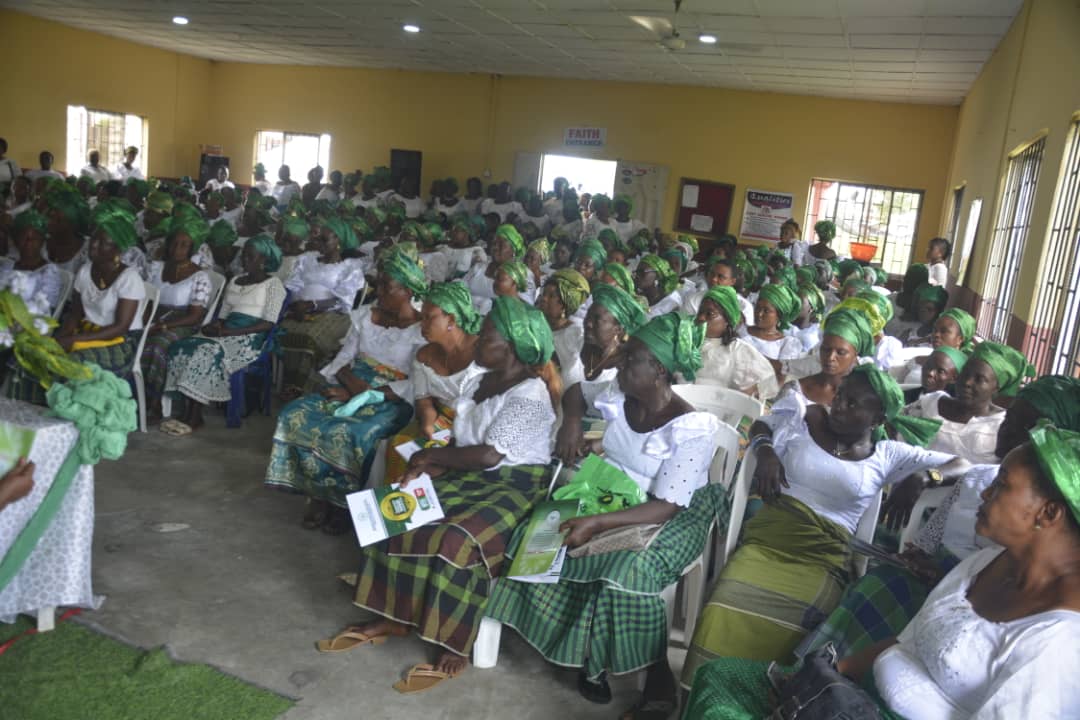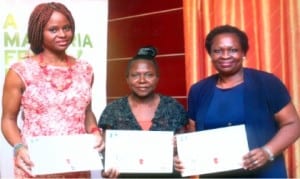Women
The Plight Of The Girl- Child (II)
Continued from Friday, December 11, 2015 edition.
In our society today, there is a total disregard of the pro
visions of the various conventions on the education of children without discrimination. Parents upholding axiom that women education ends in the kitchen, prefers to train the male child and decide to either give the girl out as a maid or sells her out in marriage against her will.
The truth is that, if you train a man, you have trained an individual, whereas, if you train a woman, you have trained a nation.
Even though due to modernization, women could now be found in the various professions formerly regarded as exclusive to the men, they have not gone as near as competing with the men in terms of their participation in the political and economic life of the society.
The reasons for this may be found in the fact that the traditional role of the women as perceived by men has persisted moreso, even where a woman was as qualified as her male counterpart, her role as mother and the responsibility for the domestic chores tended to frustrate her efforts to make reasonable progress in her profession.
Even among the educated women, there is no agreement as to what role they should play in society. Many if not most, would consider child-bearing and caring for children and the home as constituting the core of their participation in the socio-economic life of the society.
This explains in part why inspite of the increasing educational opportunities, women tend to drop out more than men and to consider marriage as the ultimate objective to be attained.
Again, it is discriminatory to dismiss pregnant girls from school, but retaining their male counterparts who indulge in the sexual act with them. Let her be allowed to pursue her training.
The position in many communities is that the girl child does not inherit property. The customs of many communities deny the girl child the right to inherit family property. Such property devolves on the male children of the family only.
Daughters are only allowed to enjoy possession right over the property, and give up the estate on marriage. It has been discovered that where the father gives family property to female members while alive, the male members eventually divest the female members of susch property on the death of their father.
Again, the law stipulates that no one can be discriminated against on grounds of sex. The girl child therefore has the constitutional right to own property like his male counterparts.
Female disinheritance keeps the girl child in low economic posture and undermines her personal development.
Conclusively, although, it is accepted in some instances, the males share in greater females, but not in all instances. And the justification for that lies in their differential roles to the family and the society in general.
I want the government to provide punitive measures to protect the girl child from all forms of abuse and gender effects. The constitution is non-patriarchal, so it’s believed, the judiciary should not hesitate to pronounce on this especially when confronted with cultural practices that tend to encourage gender inequality and discrimination.
Patience Aniekan
Women
Nigeria Deserves Stylish, Sophisticated Designs-Igiebor Daddy Lucky
IVY-K Fashion by Igiebor Daddy Lucky, a Nigerian-born designer now based in the UK, has launched the latest menswear line, Dapper Man.
One of the collection’s strengths is its classic, clean aesthetic. Dapper Man delivers sharp, structured suits in a timeless black and white color scheme that exudes a sense of luxury and professionalism. The use of high-quality fabrics like wool and silk ensures that the suits not only look high-end but also feel luxurious to the wearer. The designer’s focus on detail is evident in the meticulous tailoring, with fitted blazers and crisp trousers forming the foundation of the collection.
Where IVY-K Fashion shines is in the subtle yet elegant touches. The inclusion of beads as embellishments on lapels and cuffs adds a unique flair, blending traditional craft with modern tailoring. This nod to African heritage gives the collection a distinct identity, offering something more personal and culturally significant than your standard menswear line.
However, despite the elegance of the Dapper Man collection, there is a lingering sense of missed opportunity. The black-and-white color palette, while classic, feels overly safe. In a fashion landscape where bold colors and daring patterns often make the strongest impact, the collection could benefit from incorporating more vibrant hues or experimenting with unconventional fabrics. Pushing the envelope with color or texture could elevate these designs from simply elegant to truly memorable.
In addition, while the tailoring of the blazers and trousers is immaculate, the collection lacks a sense of playfulness or modern edge that many contemporary menswear lines are embracing. The suits are undoubtedly stylish, but the collection as a whole leans heavily on tradition. Experimenting with asymmetrical cuts, bold patterns, or even layering could add an exciting dimension to Dapper Man. The challenge is to maintain the sleek sophistication of the collection while infusing it with a fresh, innovative spirit.
Another area that could use improvement is the overall cohesion of the collection. While the suits are well-crafted, there is a feeling of repetition across the pieces. More variation in design, such as different lapel styles, pocket configurations, or even bolder accessories, would give the collection greater diversity and visual interest.
In conclusion, Dapper Man by Igiebor Daddy Lucky showcases the designer’s strong grasp of classic tailoring and elegant design, but to truly capture the attention of a broader audience, IVY-K Fashion would benefit from more daring choices. By infusing the collection with bold colors, unexpected textures, and a more modern edge, Dapper Man could move from a well-crafted line to a trendsetting force in men’s fashion. With such a solid foundation, there’s no doubt that Igiebor Daddy Lucky has the potential to lead his brand toward greater heights
Women
Women Can Curb Indecent Dressing
The trend of indecent dressing all in the name of fashion is fast becoming a norm in our generation and society at large. Most married women embrace this fashion as competition with single ladies.
Different scholars have given an in depth insight about dressing as a tool of communication. Non-verbal communication has been asserted as the communication between people by the means of signs or symbols. It conveys what we wish to disseminate to the public as either intentionally or not.
According to Paul Ekman and Michael Argyle, communication is carried out through what has been classified as “Presentational Code”. He listed nine codes of non-verbal communication, as body contact, facial expression, gestures, postures, eye movement, proximity, orientation, head nods and appearance.
This, being stated, married and single ladies should understand that their mode of dressing is communicative be it directly or indirectly as such body parts we call “private” are now being made public because of the trends or wearing of transparent dresses and this in turn calls on the attention of men who are weak and prone to illicit thoughts thus, resulting to most rape cases in our society.
This indecent dressing by most ladies has denied many their future husbands. The truth is that a man is attracted to his kind; his desires in marriage. It is often asserted that decency and beauty are in the eyes of the beholder, yet, in trending times of this 21st century, dress code and fashion in nudity form is gaining popularity.
This has become complicated as most men tend to toggle between their emotions (lust) and sanity (rationality) in terms of marriage, thereby setting a wrong foundation upon which most marriages are consummated.
On the other hand, most married women have embraced the trend of indecent dressing nipping it on the state of it being the choice dressing, approved by their spouses, leaving society with the question of what “responsible” man would prefer that the secrecy of the benefit of his marital vow has become the centre of attraction and viewership by the general public.
Hence, communicating with their dressing gas given licence to every male gender who is interested or attracted to what they see to make unsolicited sexual passes at them, which might be considered embarrassing.
At this juncture, it is important to state that ladies should dress decently knowing that they are the epitome of nation-building, they are nation-builders, character moulders and pacesetters not just in the lives of their families but to the society at large.
In most occasions, there are no clear border lines between the married women and the single ladies because of the rate of scanty dressing which has close the gap of differences.
Women and girls should embrace this call awakening to decent mode of dressing. Dresses that are meant to be worn indoors should remain indoors.
It is worrisome to see ladies wear shorts that are supposed to be worn in the living room on the streets without shame. This is an awakening call to our ladies, married and singles that the opposite sex do not expose their private body parts for the public. Sometimes, the ladies go about in the streets without wearing brazziers as to showcase their nipples.
The society should be sanitised of the menace of indecent dressing that is lurking and taking over the entire nooks and crannies of the society and the nation at large.
Let it be known that he or she is addressed in the manner he or she is dressed. There may be no room for a second impression. To the single ladies, your dressing decently will not stop you from meeting your Mr Right rather, it will increase your stake and place you on the list of most valued women in the society.
Dressing speaks louder than words.
Kate Chisom Isiocha
Isiocha is an OND final year student of Temple Gate Polytechnic.
Women
NWAPDI Launches Home Farming Scheme For Women In Okrika

-

 Politics2 days ago
Politics2 days agoAlleged Ugochinyere’s Expulsion, Null, Void, No Effect – PDPNWC
-
Niger Delta2 days ago
Woman Petitions IGP Over Husband’s Murder In Cocoa Farm
-

 News2 days ago
News2 days agoTax Reform: SERAP Urges NASS To Assess Human Rights Impacts
-

 Opinion2 days ago
Opinion2 days agoChild Rape: A Global Menace
-

 News2 days ago
News2 days agoStakeholder Hails Fubara Over Ekpeye Chieftaincy Title
-

 Politics2 days ago
Politics2 days agoAfter S’Court Victory, It’s Time To Work, Soludo Urges APGA
-

 Maritime2 days ago
Maritime2 days agoMOWCA, NIMET Collaborate On W’Africa Maritime Safety
-

 News2 days ago
News2 days agoKwara Hospital Threatens Mass Burial For Unclaimed Corpses


